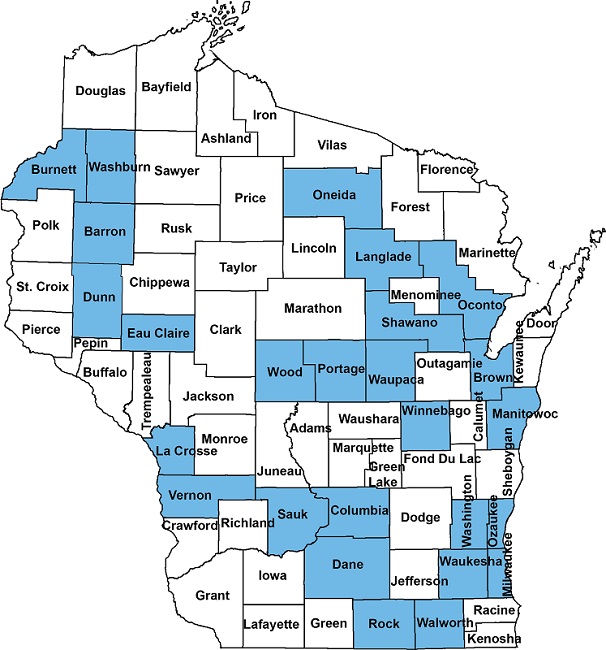Where Can You Take Wild Animals Near Me
TEMPORARY CHANGES AT Wildlife REHABILITATION FACILITIES DUE TO HIGHLY PATHOGENIC AVIAN Flu
A strain of highly pathogenic avian flu is causing illness and decease in some species of wild birds in North America including raptors (especially bald eagles), shorebirds and waterfowl. There have also been cases in domestic poultry.
To protect the health of wild birds, some licensed wild animals rehabilitators are not accepting birds into care, especially birds exhibiting neurological symptoms, which tin be a sign of HPAI infection.
Refer to the directory below to determine whether the licensed wildlife rehabilitator virtually you lot is accepting birds. If they are not, you can contact the DNR Wild animals Hotline by emailing DNRWildlifeSwitchboard@wisconsin.gov or leaving a voicemail at 608-267-0866 for a return call.
Always Call Ahead
Help reserve infinite for wild animals truly in demand. Always call a licensed wild animals rehabilitator earlier assuming a wild animal needs assist. Many wildlife rehabilitators may temporarily change how they are able to assist injured, orphaned or ill wild animals to protect their own health and safety.
How To Tell If A Wild Beast Needs Rehabilitation
Contact a licensed wildlife rehabilitator immediately if you have determined that a wild animal is sick, injured or truly orphaned. Never attempt to rehabilitate wild fauna on your ain. Wisconsin'southward licensed wild fauna rehabilitators are specially trained to provide temporary care and treatment to wild animals for the purpose of releasing them dorsum into the wild.
Consult the Go on Wild animals Wild page for detailed resources to help decide if a wild animal is truly orphaned and choose an appropriate course of action. We have printable resources for some of the most ofttimes plant animals, including baby birds, fawns and other baby mammals.
Many young wild beast species spend most of their day without their mother, who may exist abroad feeding or keeping distance to protect her young.
If you make up one's mind that a wild animal is in demand of rehabilitation, identify the animal inside a ventilated container in a dark, warm and serenity place abroad from disturbances, such as children and pets, until transport to a licensed rehabilitator can be arranged.Practice not provide food or h2o; this can do more damage than expert. Run across our Recommendations For Transporting Wildlife [PDF] for more data.
Temporary Changes To Wildlife Rehabilitation Procedures
Information technology remains a concern whether SARS-CoV-two can become established in wild beast populations. Across the potential threat to wildlife, this could pose a threat to human wellness equally well should the virus go established in the wild and become a reservoir.
To protect confronting the potential introduction of SARS-CoV-2 into wild creature populations in Wisconsin, the DNR has put in identify temporary modifications to rehabilitation procedures to protect the health of Wisconsinites and wildlife.
There are increased biosecurity requirements for white-tailed deer rehabilitation this year, and space may exist limited for new white-tailed deer patients. This spring be sure to call a licensed rehabilitator earlier handling a fawn. Fawns spend most of the mean solar day on their own and are not abandoned.
Bat Rehabilitation
Currently, the licensed rehabilitation of big dark-brown bats nether increased biosecurity is allowed during summer months only due to their susceptibility to SARS-CoV-2. The rehabilitation of all other bat species is temporarily suspended.
Refer to the bat ofttimes asked questions folio for information on how to handle common bat situations.
Bobcat (Felid), Weasel Species, Mink, Fisher, and Otter (Mustelid) Rehabilitation
Currently, felid and mustelid species may non be brought to a wildlife rehabilitator for care or handling due to their susceptibility to SARS-CoV-two, only rehabilitators may however be able to provide advice over the phone or email. You lot may also contact local Wildlife staff for help.
Contact a licensed wildlife rehabilitator immediately if you accept determined that a wild animal is sick, injured or truly orphaned. Never attempt to rehabilitate wildlife on your own. Wisconsin's licensed wildlife rehabilitators are peculiarly trained to provide temporary care and treatment to wild fauna for the purpose of release back into the wild.
You lot can refer to the Keep Wildlife Wild folio, bird [PDF], mammal [PDF] or fawn [PDF] guides for help determining whether a young animal is truly orphaned and in need of aid.
Deer Rehabilitation
Orphaned, ill or injured deer are recovered every twelvemonth by the public and department staff and placed with licensed deer rehabilitators. The CWD affected counties [PDF] and the deer rehabilitation policy are in outcome to outline the desired procedures for the intake, release and marker of deer to accost illness management problems as well every bit compliance with state and federal laws. Specific geographic guidance will be communicated past the section directly to all licensed rehabilitators in the state annually or more than frequently if necessary.
A 2021 study published in the Journal of Virology [Exit DNR] documents the susceptibility of white-tailed deer to SARS-CoV-two.
Additional Resources
- The Association of Fish and Wildlife Agencies (AFWA) has provided further guidance on the rehabilitation of bats every bit well every bit on mustelidae, felidae and canidae species [PDF] during the COVID-19 pandemic.
- The Centers for Disease Control and Prevention (CDC) provides more information on reducing the take chances of spreading SARS-CoV-ii between wild animals and humans [Go out DNR].
- Guidance on SARS-CoV-2 and free-ranging white-tailed deer
Locate A Licensed Wildlife Rehabilitator
The bluish counties on the map correspond locations of licensed wildlife rehabilitators. Click the county name in the table below for a list of wildlife rehabilitators and their contact information.
Delight note that this map and tabular array listing only a portion of Wisconsin's licensed wildlife rehabilitators. If you are a licensed Wisconsin wildlife rehabilitator and would like to be added to our webpage, please contact the Wild fauna Rehabilitation Program.
Source: https://dnr.wisconsin.gov/topic/WildlifeHabitat/directory.html
Posted by: davisdorbacted.blogspot.com


0 Response to "Where Can You Take Wild Animals Near Me"
Post a Comment